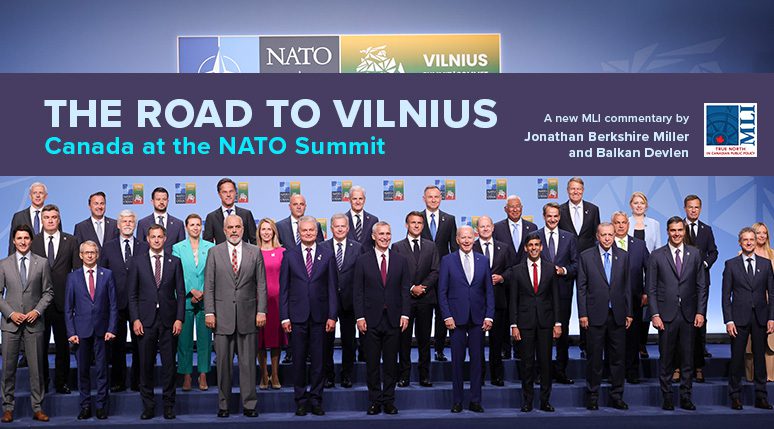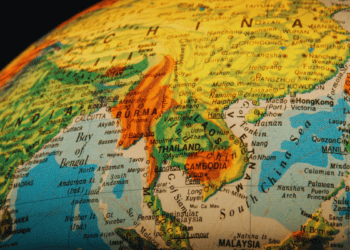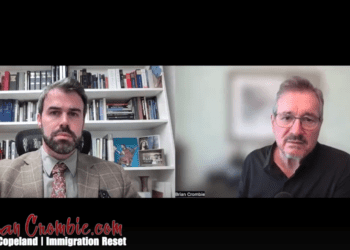By Jonathan Berkshire Miller and Balkan Devlen
July 17, 2023
This series of three articles originally appeared in the National Post in the lead up to the NATO Summit in Vilnius (July, 2023). Jonathan Berkshire Miller, Senior Fellow and Director of Foreign Affairs, National Defence and National Security at the Macdonald-Laurier Institute, and Balkan Devlen, Senior Fellow and Director of the Transatlantic program, collaborated to lay out distinct policy priorities and a plan of action for Canada at the NATO Summit.
Canada must champion Ukraine’s rapid integration into NATO
Supporting Ukraine is not charity; it’s enlightened self-interest for the West.
Transatlantic allies will be meeting in Vilnius, Lithuania, on July 11 and 12 for a NATO summit as Russia’s war in Ukraine continues. The meeting will also take place just weeks after one of the most bizarre episodes in recent Russian history – the failed mutiny/rebellion/attempted coup by ex-convict and head of Wagner mercenaries Yevgeny Prigozhin.
There are several themes likely to be discussed at the summit, from enshrining the principle of two per cent of GDP for defence spending as a minimum rather than an aspirational ceiling for alliance members, to the nature of the threat that China poses to the security and prosperity of the organization.
But the attention of the world surely remains on the question of Ukraine’s future membership in NATO.
On this question the choice is clear. Canada must not falter in its support for Ukraine. Ottawa must throw its weight behind a fast-track NATO membership for Ukraine after the war ends. This action, a deviation from the traditional membership action plan, is a necessary response given the high stakes and the fact that the Ukrainian military continually proves itself to be a capable fighting force that any alliance would be lucky to have.
Not only will fast-tracking Ukraine’s NATO membership signal our unwavering commitment to “stand with Ukraine as long as it takes,” as Prime Minister Justin Trudeau keeps reminding us, it will also serve as a significant deterrent against further aggression by Russia after the war.
Frankly put, the critics of NATO enlargement got it wrong. It was the failure of NATO to extend membership to Ukraine in the 2008 Bucharest summit that enabled the Russian invasion in 2014, not vice versa. We can’t make the same mistake again.
Rather than dithering and taking a “wait-and-see” approach, Canada should also advocate for a robust and empowered NATO-Ukraine Council, which will be announced at the Vilnius summit. Such a structure would allow Ukraine to become deeply integrated in NATO’s structures as much as possible. This council should be more than a symbolic entity – it should be an active, operational platform for co-operation and support for Ukraine until its eventual membership.
In addition, Canada needs to call for the termination of the NATO-Russia Founding Act of 1997. This act has become obsolete in the face of Russia’s behaviour in the past decade, which culminated in the full-scale invasion of Ukraine in 2022. Its dissolution will enable the process of permanently stationing NATO troops in the Eastern flank, including the Baltics and Poland, to begin. Canada should also demonstrate its commitment by expanding and making its Latvia mission a permanent brigade-size deployment, thereby bolstering NATO’s Eastern flank.
Political will and stamina in the West are key uncertainties in how this war will unfold in the coming months. We must ensure that Ukraine is not left vulnerable to the changing winds of domestic politics during its transitional phase into NATO. To this end, Canada should join its willing allies and articulate clear security commitments to Ukraine until its full NATO membership after the war. The specific nature of these commitments can be discussed either bilaterally with Ukraine or preferably in a mini lateral setting with a “coalition of the willing” within NATO.
While we take steps to support Ukraine in the present, we must also assure Ukrainians of a secure future. At the Washington summit next year, when NATO celebrates its 75th anniversary, Canada should push for a clear timeline for Ukraine’s full membership. Setting a definitive course will dispel any doubts and convey our firm commitment to Ukraine’s rightful place within NATO.
Lastly, it is crucial that we boost our commitments and support for Ukraine. This includes not only diplomatic and military efforts but also economic ones. Encouraging investments by private Canadian companies in Ukraine, in partnership with Ukrainian businesses, can foster mutual prosperity and further strengthen the bonds between our nations. A particularly impactful commitment would be for the Canadian government to create an insurance fund guaranteeing Canadian investments in Ukraine’s defence sector and production. We may not have sufficient stocks of military equipment and ammunition to give to Ukraine but we can enable their production in Ukraine.
To be sure, these steps are not without challenges. Yet the cost of inaction is far greater. Allowing the question of Ukraine’s future in the alliance to slip would embolden Russia, and would also be noted by other authoritarian actors – especially China. Canada must stand at the forefront of this effort, championing Ukraine’s swift integration into NATO. We must remember that supporting Ukraine is not charity but enlightened self-interest for Canada and the rest of the democratic world.
NATO can’t ignore China’s challenges
The growing alignment between Beijing and Moscow is firmly premised on a desire to erode international order.
At the NATO summit this week in Vilnius, Lithuania, the alliance’s attention first and foremost will be on supporting Ukraine. As we argued last week, the alliance should recognize that a rapid integration of Ukraine into NATO is not a form of charity but enlightened self-interest.
Yet while Russia’s brutal war has spurred the alliance to new levels of coordination and unity, there is another challenge further afield that equally demands attention. China’s increasingly disruptive role globally has rightlycaught the attention of NATO, which for the first time labelled the behaviour of the People’s Republic of China (PRC) as a “systemic challenge” to Euro-Atlantic security in its strategic concept paper released ahead of last year’s summit.
Indeed, before Russia’s renewed aggression in Ukraine in February 2022, there was a defined push from many NATO member states – led by the United States – to incorporate a greater focus both on China and more broadly on the IndoPacific region.
Russia’s illegal war in Ukraine has done nothing to take away this focus on Asia. If anything, the war has magnified the stakes at play for NATO to integrate
more deeply with liberal democratic partners in the region. This week in Vilnius, it is expected that the leaders of the so-called “Asia-Pacific 4 (AP4)” – Japan,
South Korea, Australia and New Zealand – will attend the summit as guests of the secretary general. This would follow up on a similar high-level inaugural presence at last year’s NATO summit in Madrid.
But it’s not just symbolic. In the aftermath of Russia’s invasion, all four AP4 states moved in unison with NATO allies to place economic sanctions on Russia. This was done despite particularly challenging diplomatic and economic considerations, especially for the large Northeast Asian economies, Japan and South Korea, that are close neighbours to Russia. The rationale however was simple. America’s key allies in Asia recognize that the egregious Russian challenge to the rules-based order could not stand or be met with short-sighted euphemistic diplomatic wordsmithing.
The more consequential reason for their support however is the social contract AP4 states have entered with transatlantic partners. Effectively, there is an implicit expectation that, should there be a contingency or conflict in the IndoPacific region because of China’s growing assertiveness, European states also need to stand with their Asian partners.
This leads back to a fundamental area of consensus between the AP4 and NATO – the convergence of threats to the rule of law, freedom of navigationand international norms is at stake in both theatres. While Beijing and Moscow have several areas of mistrust and disagreement, there is no denying that their alignment is growing and is firmly premised on a desire to undercut and erode an international order that they view as anathematic to their interests. This “friendship without limits” has real security concerns that should keep NATO’s attention on the direct interconnections between the transatlantic and Indo-Pacific.
Moreover, the challenges China poses alone are sufficient to alert NATO’s attention. This is not to imply that NATO intends – or should intend – to expand the alliance to the Indo-Pacific to combat China. These arguments are non-starters that form the backbone of propaganda and disinformation efforts propagated by Moscow and Beijing. However, as we are seeing on a range of trans-national challenges – from cybersecurity, critical minerals and technology to coercive tactics in the maritime domain – China poses fundamental challenges to the open international order that NATO states have equities to defend.
What should NATO do about it? First, there should be a more focused and united effort to court the AP4 grouping and ensure that momentum is not lost in the coming years. There have been some cracks in the surface recently with some member states showing discomfort with the increasing focus on China, worrying it will lead to mission creep for the alliance and take away attention from Russia’s threat. More worryingly, others in Europe are stubbornly unwilling to confront the reality of a potential economic cleavage with the Chinese economy in a future contingency, over Taiwan or elsewhere.
It’s time for alliance members to remain eyes wide-open on the challenge China poses to their interests and values. This is especially true for Canada, which released an Indo-Pacific strategy last November highlighting concern about China as a “disruptive actor.” As an Indo-Pacific and transatlantic nation, Ottawa should be one of the consistent voices within NATO to promote the alliance’s greater clarity and attention to the challenges posed by Beijing.
Second, NATO should move the discussion forward with concrete and specific dialogues with Indo-Pacific partners on the most identifiable shared threats that China poses to both theatres. Areas could include malicious cyber behaviour, destabilizing activities in the maritime domain, activities to challenge norms in space, and the role of Beijing’s leveraging of economic and trade relationships for geopolitical gain.
Some NATO members may not want to entertain the idea of confronting Chinese threats while their hands are full with Russia, but kicking the can down the road and avoiding the issue will only lead to more stress and pain for the alliance in the long run. The best remedy for a potential future crisis is preparation.
Canada’s days of freeloading on NATO allies must end
Trudeau can no longer ignore calls for increased defence spending – something two-thirds of Canadians support.
As NATO leaders meet this week in Vilnius, the alliance is faced with profound geostrategic challenges – primarily from Russia and China. These challenges amount to the greatest test to NATO since the collapse of the Soviet Union and the end of the Cold War. Amidst this backdrop, we have seen profound shifts within the alliance.
How are our allies responding? First, we have seen the landmark decisions by both Finland and Sweden to accede to NATO (the former has joined, while it is expected the latter will follow shortly). Second, there has been a marked pivot for several states to commit to greater defence spending. Poland has pledged to double the long-established NATO commitment of two per cent of GDP spending on defence to reach four per cent. Meanwhile, despite its uneven approach to Russia’s war in Ukraine, Germany has shaken off complacencyof the past and agreed to meet the two per cent target through its announced Zeitenwende or “turning point.”
This is not just limited to partners in the alliance. Our most trusted Asian allies – Japan and South Korea – are also stepping up. In perhaps an even more significant shift than Berlin, Japan announced last year its aim to double its defence spending to the two per cent threshold within the next five years. Meanwhile, South Korea, a country that has long spent on national defence due to the constant threat from North Korea, has been one of the most reliable backfillers of arms to Europe outside of the United States.
Meanwhile, where has Canada been? Ottawa remains stuck at approximately 1.3 per cent of GDP on defence, despite these tectonic shifts in the geopolitical landscape. Making matters worse, according to recently leaked documents, Prime Minister Justin Trudeau has indicated that not only will Canada not commit to meeting the two per cent spending target, but that the country may never reach that amount. This lines up with Canada’s long-delayed defence policy update and the fact that defence spending was buried deep in the past federal budget.
With this context, the Vilnius summit is sure to be uncomfortable for Canada as NATO Secretary General Jens Stoltenberg looks for firm commitments from NATO allies to commit to a new defence investment pledge where two per cent spending is viewed as a floor rather than a ceiling.
Critics may argue that the two per cent threshold is not a particularly useful metric, and they are partially right considering the roles and responsibilities
allies are willing to take on. Canada, for example, has taken key leadership roles in Afghanistan and Iraq and is currently in Latvia, bolstering NATO’s Eastern Flank. Yet, while the metric is not perfect, it has been agreed to by the allies since 2014 and it is time to stop complaining and start getting to work.
Even if the two per cent spending target is not achievable in the short term, Ottawa is also lagging in terms of unique capabilities so cannot make the argument that we are delivering superior capabilities to contribute to the alliance as a counter to the falling behind on raw defence spending. Moreover, there will be pressure coming from allies who are putting forward credible plans to reach the target by pledging necessary resources to be able to fulfil their commitments. There is a strong push to make two per cent the floor and not an aspirational target in Vilnius. Canada will be among the few who stand out for its lack of support on this issue.
The lack of capabilities – both in qualitative and quantitative terms – was on clear display with our inability to participate in the recent NATO Air Defender 23 exercises in Germany. The capability crunch has also hurt our capacity for Air Policing missions in Europe for the foreseeable future and will limit our ability to commit to naval missions in Europe/Atlantic and in the Indo-Pacific at the same time. This comes on the heels of a new Indo-Pacific strategy where Ottawa pledged more defence resources for Asia.
Canada will also struggle to upgrade its NATO presence in Latvia to a brigadelevel and, until recently with the Prime Minister’s announcement to bolster Canadian presence, no clear plans were being made about how Canada will fulfill its pre-existing commitments on this issue. The plan is notable, but whether it is sustainable in the longterm remains in question.
Finally, it’s a red herring to claim that Canadians are unsupportive of a stronger defence posture. Trudeau has recently dismissed calls from several experienced Canadian experts and former defence officials to urgently meet the spending targets by implying that national security and defence spending is not a top-tier priority requiring a drastic re-think. Yet, this attitude manifestly does not represent the views of Canadians. A recent poll from Nanos shows that approximately twothirds of Canadians understand the global security environment is changing and Canada needs to meet its targets on defence and do more.
Canada has a host of challenges that it needs to take care of in the coming years to protect Canadians and support our allies. We need more robust investment in public-private partnerships and defence innovation, as well as research on over-the-horizon capabilities. These investments will come in addition to our own continental responsibilities for Norad modernization, shoring up our Arctic and ensuring we procure modern and capable submarines. None of this will be possible on the cheap.
Next year, NATO will mark its 75th anniversary with a landmark summit in Washington, an ally that has long permitted – albeit with cyclical criticism – our defence free-riding. The days of hoping that the U.S. will overlook our lowballing commitments are over. Canada has finally recognized that the world has changed, and security threats are building. Now it is time to spend and invest in our future to ensure we protect Canadians and do our fair share to promote liberal values and the rule of law.
About the authors
Jonathan Berkshire Miller is an international affairs professional with expertise on security, defense and geo-economic issues in the Indo-Pacific. He has held
a variety of positions in the private and public sector. Currently, he is a senior fellow and director of the Foreign Affairs, National Defence and National Security program at the Macdonald Laurier Institute.
Balkan Devlen is the Director of the Transatlantic Program and Senior Fellow at the MLI. He is a professor, foreign policy analyst, and consultant with over two decades of experience across three continents.






